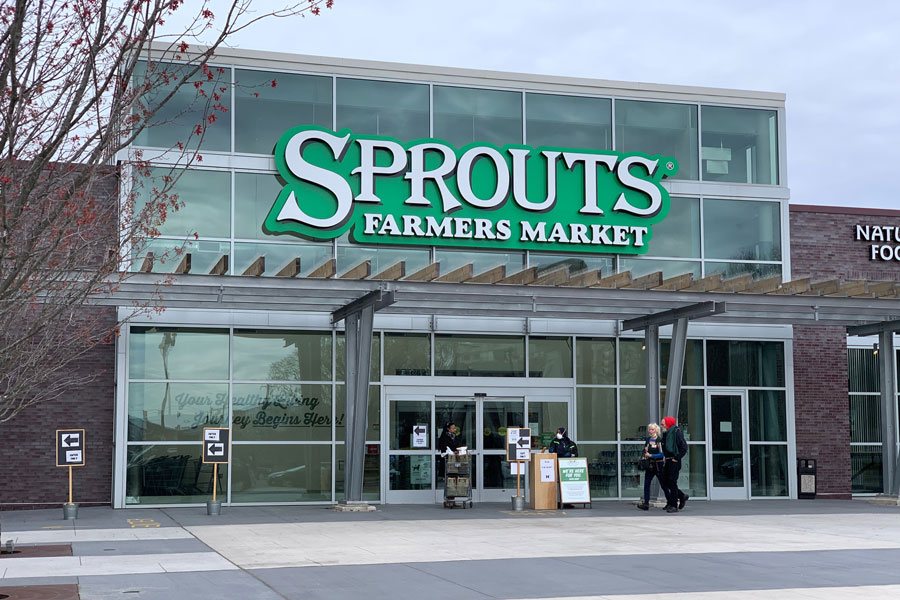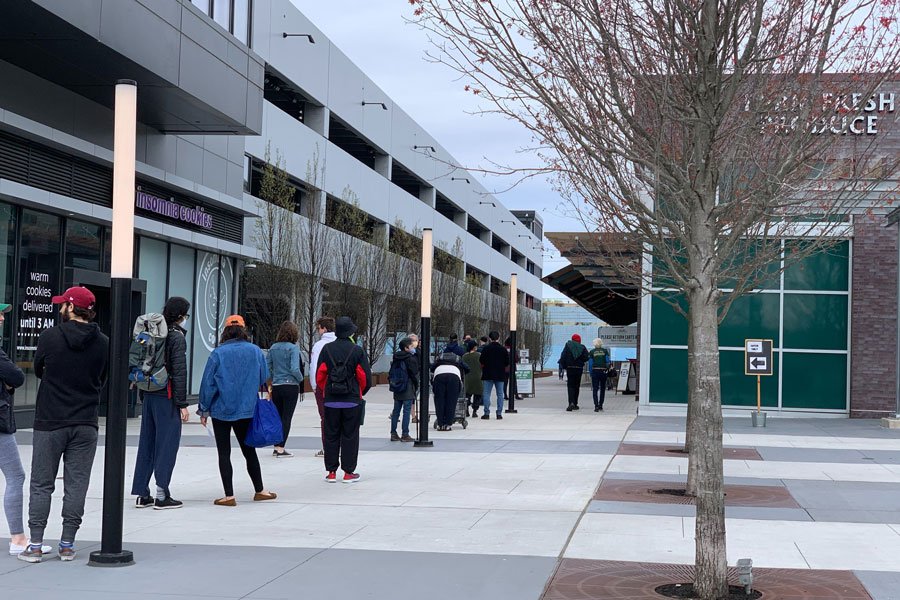Should I Shop for Groceries in Person or Order Them Online During the Coronavirus Crisis?
Like many personal choices affected by coronavirus, what once was a seemingly simple question is now a moral quandary.

During a pandemic, what’s the better choice for those who have one: to do online grocery shopping, or to visit the store in person? Photograph by Caroline Cunningham
Ever since the coronavirus pandemic dramatically altered life here in Philly (and everywhere), I’ve continued making in-person treks to the grocery store. Over the past several weeks, those visits have changed to include as much social distancing as possible, a homemade cloth mask, and gloves.
On my most recent trip, as I waited in a socially distanced line that curved around the side of Sprouts Farmers Market out toward Broad Street, I wondered: Is going to the store in person still the morally right decision?
Of course, to ask this question at all is a privilege. I have internet access and credit cards that making shopping online possible. I am, as of now, very healthy. I have no known underlying health conditions, and I’m young — which statistically makes it more likely that should I contract the coronavirus, my symptoms will be mild.
But pandemics have a way of bringing into focus how all of the seemingly small and mundane choices we make impact those around us. While the question of “Should I buy groceries in person or online?” seems simple, it’s not. On the one hand, given that as many as 25 percent of infected people may be carrying the virus without symptoms, going in person could potentially mean shedding the virus all over the grocery store. On the other hand, the option of staying home and having someone else fill up a cart and deliver it to me potentially puts that person’s health at risk. Then again, ordering online does let others get paid for work — work they may need right now, as unemployment claims hit historic highs.
To help sort through this moral quandary — and the many factors that come into play — I called up Jonathan Moreno. The esteemed Penn medical ethics and health policy professor — the American Journal of Bioethics has called him “the quietly most interesting bioethicist of our time” — is co-host of the new bioethics podcast “Making the Call.” Here’s what he had to say on the matter. Warning: As with many issues in this pandemic, there’s no simple answer.
Philadelphia: We’re in a unique situation where some of us are thinking a lot more about how our actions impact others. Grocery shopping is something that everyone still needs to do to some extent, but there are a lot of questions around this.
Moreno: In reading history about epidemics and pandemics, what happens is, every dial gets turned up to 10. Everything that is characteristic of our society that we don’t usually pay attention to — or that is somehow suppressed — starts to take on extreme variables, as the statistician would say. And you see that in every episode of every epidemic or pandemic of scale, starting in the ancient world. It affects every dimension of life. To bring it down to a little more detail, what’s dominating the news in the last 48 hours is there are many class differences, which we are familiar with. That is to say, people of means have always been able to avoid doing work that is generally considered to be less desirable. But now, there’s also a very clear racial dimension to this. Which has always been in the background, but now the scab has been ripped off.
Now, if you’re in this current situation, if you’re in a high-risk group, I think you can make a plausible justified determination that you have to protect yourself from going into grocery stores if at all possible. But of course, there are many people, and they are disproportionately people of color, who don’t have that opportunity. And, by the way, there are still some people who don’t have very good access to the internet.
If you’re in one of those risk groups, I think you can make a justifiable argument. But if you’re not, what you can do — besides all the other things you can do, philanthropically and so forth — is decide that you’re going to minimize your trips to the grocery store, if you have to go. Or if you’re ordering out, try to minimize your ordering. You keep a list and pack all of your orders into a single delivery every couple of weeks. Now, that still doesn’t really solve the problem, because the paradox, as you mentioned before, is that you have people who need these jobs, and the less delivering they do, the less need there is for them to be on the job. So I think in the short term, this is a moral paradox that is really hard to resolve. In the longer term, you hope that one of the consequences is that we recognize these inequalities and do better as a society in addressing them.
“In the short term, this is a moral paradox that is really hard to resolve. In the longer term, you hope that one of the consequences is that we recognize these inequalities and do better as a society in addressing them.”
So it sounds like if you’re not in a high-risk group and you have no reason to not be going to the grocery store (i.e., you’re not sick), you should still be doing it. The question I’ve also been wrestling with is: Am I contributing to a problem by potentially being one of the asymptomatic people spreading germs around the grocery store, as much as I’m obviously trying not to do that, but just by being there?
You’re wearing a mask, you’re wearing gloves; nonetheless, there’s still a possibility, because the virus is very vicious and determined, and there’s still some uncertainty not only about how long it lasts on surfaces, but also about how much of the virus you’re shedding, particularly when you’re asymptomatic. Something we all can do is start writing to the big employers — the Amazons and the Walmarts and the Whole Foods and whatnot — to remind them that they have an obligation to protect their workers as best they can, and that means masks and gloves and working out their systems so they have physical distance from each other. So exert some public pressure to improve the conditions of the workers and, if you’re so inclined, even support unionization, because the truth is, that is what has protected people over the years in many industries.

A spaced-apart line waits to enter Sprouts Farmers Market in Philadelphia. Photograph by Caroline Cunningham
Are you personally continuing to make trips to the grocery store, or have you moved to shopping online?
It’s something we have struggled with. My wife and I are both 67, otherwise healthy. I’m looking at the numbers, and I do medical ethics, and I have seen intensive care units, and I have close family members in intensive care units, and even if you do well in an intensive care unit, there are still consequences to being in an ICU. We have made trips to the grocery store. My wife made a trip to the drugstore yesterday and went into a grocery store with a mask. She was surprised that not everybody was honoring distancing. So that makes it very difficult. I think we have agreed that we are going to do food orders. We’ve got a couple dozen food items in a cart right now on Amazon that we’re going to try to hold off ordering for a while. As everyone has said, because everything is so extreme, every decision seems to be more critical. And if you’re at all thoughtful about life, you’re reflecting even about taking a walk more than you would a month ago. And this is no different. So I think the most positive thing I can say is, it’s good for people to be aware that they have to make choices that are moral choices.
There are those who are unable to order online because they’re using food stamps. How should we take that into consideration?
Yes, or who just don’t have access to the internet. There are also some people who still use cash. There’s so much that people who have a comfortable living standard take for granted.
“Our moral senses are so much sharpened now by what’s happening, and that’s a good thing.”
Given that there are people who can only shop at the store, am I causing problems for them by going to the store myself and taking up a spot?
It’s almost imponderable. No choice is ever made without some consequences, and the downsides and the upsides — again, it’s just like everything else. Everything is more extreme. I don’t really know how to advise whether you should be taking up that space or not, but it does reflect back on our capacity and our self-awareness and the fact that these moral choices have far greater implications. Our moral senses are so much sharpened now by what’s happening, and that’s a good thing. One of my old bosses used to say: Guilt is a noble emotion. We have, I think, too often psychoanalyzed guilt, and without criticizing the psychoanalysts too much, it may be that guilt does play a sort of very important role. Or at least that it’s a barometer of something we should be aware of, and that we can’t just leave it at that. We have to reflect on it. It’s okay to feel some guilt if it leads to some action.
This interview has been edited for length and clarity.
Correction: This article was updated to note that 25 percent of infected people may show no symptoms of the coronavirus.

Philadelphia magazine is one of more than 20 news organizations producing Broke in Philly, a collaborative reporting project on solutions to poverty and economic mobility in the city. Read all our reporting here.


